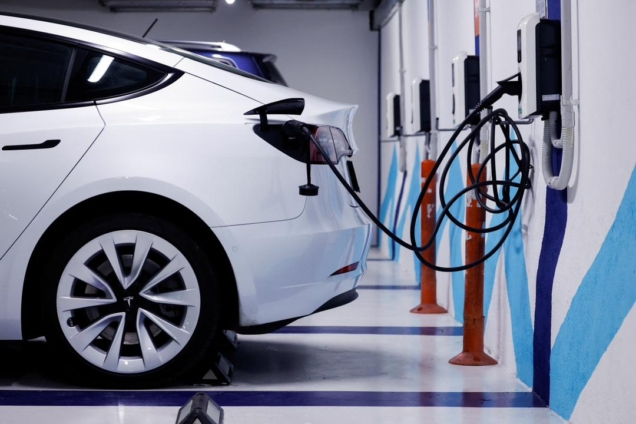One of the things I really like about the budget was the import duties waiver on semi-knocked down and completely knocked down electric vehicles imported by registered EV companies in Ghana for 8 years.
This comes after the Vice President, Dr. Mahamudu Bawumia in September visited the offices and assembly plant of Solar Taxi, a wholly Ghanaian start-up engaged in the assembly and manufacture of electric cars, motorcycles, buses, and battery packs for electric cars, and stated that the government of Ghana is working on a policy framework to move public transportation from a dependence on petroleum fuels to electric vehicles.
As a sustainability practitioner and a watcher of the Sustainable Development Goals (SDGs), this is a big deal for Ghana’s climate and sustainability credentials. Ghana has climate obligations like the NDC (Nationally Determined Contribution) which is essentially about cutting emissions and adapting to climate impacts, the Intergovernmental Panel on Climate Change obligations (IPCC), the United Nations Framework Convention on Climate Change (UNFCCC), etc all geared towards climate action to reduce the consequence of climate change and its exacerbated impact on society.
What are electric cars?
An Electric Car (EV) is essentially an automatic vehicle with an electric motor powering it. A fully electric car does not run on or have a petrol or diesel engine. With an Electric Car, when you place the car in 'drive' mode, the vehicle accelerates just like an automatic vehicle. There are no gears in electric or hybrid cars.
They are all always fully automatic cars. When the accelerator is pressed, power is transferred from the battery to the electric motor. The motor is powered resulting in the drive shafts turning the wheels. When the car brakes, the car begins to decelerate and the motor becomes an alternator, generating power. This power is then sent back into the battery.
The importance of electric cars in today's world
Electric cars are ever more appealing in a world where reducing carbon emissions and pollution is a growing concern for many people and impacts all facets of the global economy. Research has shown that electric cars are better for the environment since their usage emits fewer greenhouse gases and air pollutants compared to traditional cars in the system which uses brown energy, petrol, or diesel. The major benefit of electric cars is the contribution that they can make towards improving air quality in towns and cities. With no tailpipe, pure electric cars produce no carbon dioxide emissions when driving. This reduces air pollution considerably. Put simply, electric cars give us cleaner streets, making our towns and cities a better place to be for pedestrians and cyclists. Over a year, just one electric car on the roads can save an average of 1.5 million grams of CO2. That’s the equivalent of two return flights from Accra to Cape Town.
This is hugely significant to the course to achieving SDG 11, sustainable cities and communities where by 2030, there will be a reduction in the adverse per capita environmental impact of cities, including by paying special attention to air quality and municipal and other waste management and provide universal access to safe, inclusive and accessible, green and public spaces, in particular for women and children, older persons and persons with disabilities.
Evolution of the global electric car stock
Until 2015, the United States accounted for the largest portion of the global electric car stock. In 2016, China became the country with the largest electric car stock, with about a third of the global total. China has more than 200 million electric two-wheelers, 3 to 4 million low-speed electric vehicles (LSEVs), and more than 300 thousand electric buses, China is also by far the global leader in the electrification of other transport modes. The year 2021 was a major leap forward for electric vehicle sales. Sales of electric vehicles doubled from 2020 to 6.75 million. The number of EVs sold in a week in 2021 was higher than how many were sold in the whole year of 2012. The year 2022 came on strong, breaking records. EV sales exceeded 10 million, with 14% of all new cars sold being electric, quite the jump from 9% in 2021 and less than 5% in 2020. That resulted in more than 26 million electric cars roaming global roads in 2022, representing a 60% uptake from 2021. Assessments of the EV industry indicate that the electric car stock will range between 9 million and 20 million by 2020 and between 40 million and 70 million by 2025.This is a clear statement that with the right investment, the right policy framework, and deliberateness, the implementation of the government of Ghana is possible.

What is being done elsewhere?
- In France, recent legislation mandated that 50-75% of parking bays in any new or renovated residential building must be pre-installed with conduits that allow the easy installation of EVSE ranging between 7 kW and 22 kW. In commercial buildings, 5-10% of parking bays must have conduits suitable for installing EVSE with a power rating of at least 22 kW. Also in France, financial incentives can take the form of a tax credit equivalent to 30% of a home charger or subsidies for the installation of residential or workplace chargers.
- In China, the central government supports municipalities deploying public charging infrastructure by subsidizing the construction of charging stations.
- Norway provides EVSE public funding for fast-charging stations every 50 km (on average) on main roads and contributes to deployment incentives for public chargers.
- Sweden offers financial support for the development of charging infrastructure. In 2015, the funding amounted to SEK 130 million.
- In the United Kingdom, individuals receive GBP 500 (USD 650) for the installation of a dedicated home charger for an electric car, and businesses are entitled to grants of GBP 300 (USD 400) per socket to fund charge points for fleets and/or employees and receive tax breaks for investment on large EVSE deployment. Local authorities also receive refunds to install roadside charge points in residential areas.
- In the United States, most EVSE support takes place at the state level. For example, the state of Colorado provides grants of up to 80% of the costs for an EVSE unit and installation
How can Ghana realize this dream?
To realize this dream in Ghana, Ghana will need huge investment in the building of EV infrastructure and a dedicated energy source. There must be the building of charging ports across the country, building local expertise, huge consumption burden on our already jittery energy infrastructure. This will mean Ghana will have to tap into renewable energy sources for such a project. Otherwise, it will be Cos 90 (zero) because the majority mix of our energy in Ghana is brown energy, and fossils, which pollute the environment and accelerate the destruction of the environment and warming of the environment. Also, if the usage increases and we still rely on our current energy mix, at the generation level, where high demand and scarce capacity could increase prices, resulting in the burning of more fossil fuels to meet the growing demand. At the transmission/system operator level, where stress on the system during peak times requires more system services, such as frequency control, and the need to maintain reserve power capacity, and finally at the distribution level, where the overloading of power lines and transformers and voltage drops could occur affecting businesses and industries.
It is therefore clear we need to tap into renewable sources like solar which have a huge prospect across the country and due to our location, south of the Sahara. Solar is costly at the initial stage and we will need a huge financial commitment mainly from strategic investors and a great deal of deliberateness to get it kicking. The promises of import duties waiver on semi-knocked down and completely knocked down Electric vehicles imported by registered EV companies in Ghana for Ghana until 2032 is good. It will help us to test the water, and give our development partners and individuals the confidence that Ghana is ready for such investment but we must keep that the focus, keep a deliberate posturing, and incentivize other local companies within the space to accelerate growth and realize this dream.
Credit: Professor Gabriel Takyi, Department of Mechanical Engineering, KNUST, Virta etc.
*******************
The writer, Eugene Osei-Tutu, holds a Bachelor of Science degree in Meteorology and Climate Science and currently wrapping up a postgraduate degree in Energy and Sustainable Management. Eugene Osei-Tutu currently works as the producer for talk-related programmes of LUV FM, a radio subsidiary of the Multimedia Group Limited.
Latest Stories
-
Samson’s Take: Arrogance of Power, Shameful Policing
5 hours -
Burnley score late to draw with Manchester United at Old Trafford
8 hours -
Bayer Leverkusen extend unbeaten run to 46 games after draw with Stuttgart
8 hours -
Chelsea come from two goals down to draw against Aston Villa
8 hours -
Andre Ayew scores in Le Havre’s 3-3 draw with PSG
8 hours -
GPL 2023/24: Kotoko draw with Medeama; Samartex go 7 points clear of Nations FC
8 hours -
Mahama cuts sod for construction of new multipurpose Jakpa palace in Damongo
8 hours -
NSS management assists Papao fire victims
9 hours -
EXPLAINER: Will dumsor end soon?
9 hours -
IMANI Africa takes on EC, accuses it of lying and publishing half truths
10 hours -
Manasseh Azure calls for investigation and prosecution of those responsible for GRA/SML contract
10 hours -
Kwesi Atuahene: Ghana’s health capital depends on HealthTech – Africa Center for Digital Transformation
11 hours -
13 signs your wife is planning on leaving you and you have no idea
11 hours -
IMANI Africa: Ghana’s EC’s dangerous and pathological conduct
11 hours -
If I speak there will be fire – Salah on Klopp row
12 hours

